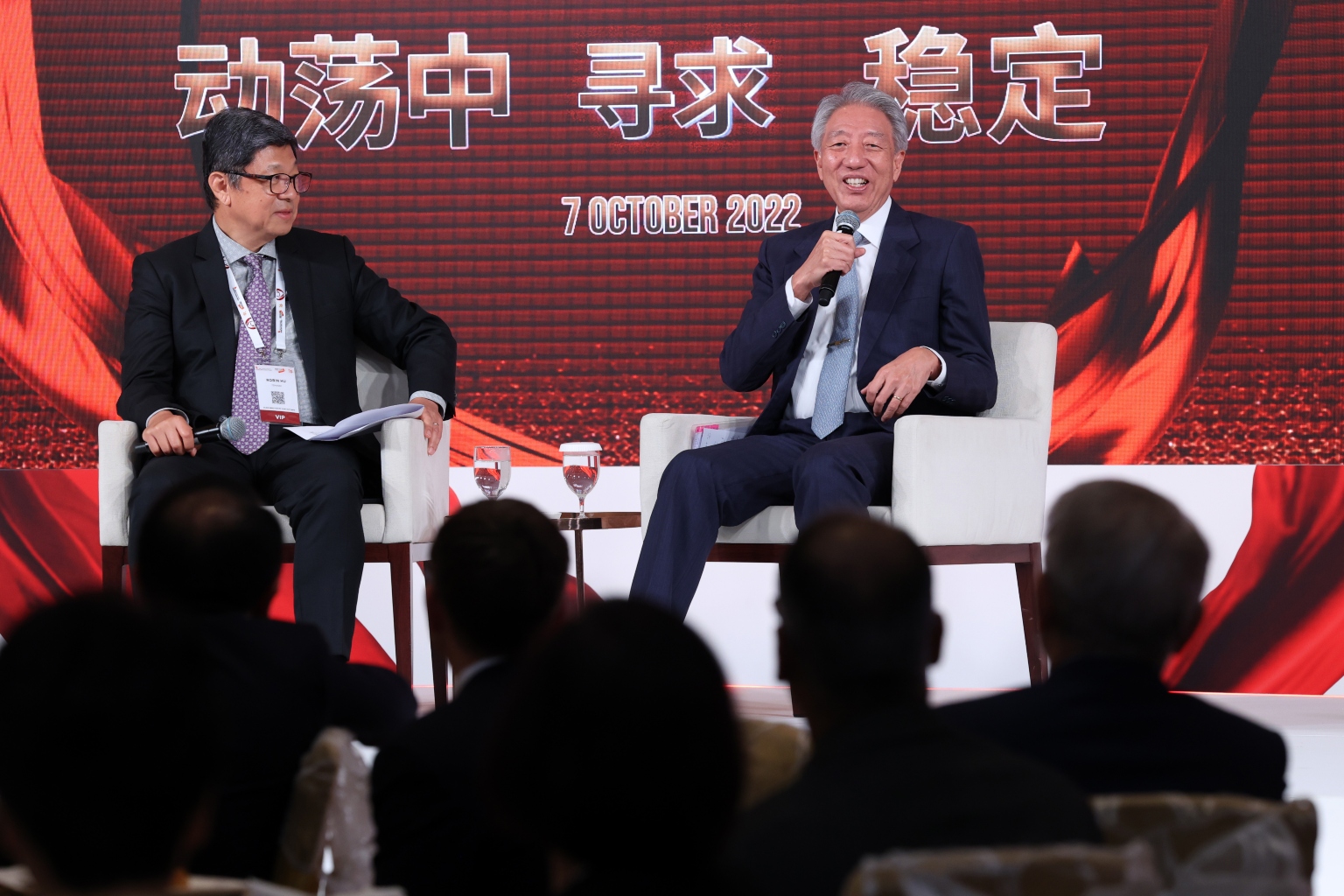A key lesson from Ukraine is how countries can take steps to avoid going to war: SM Teo
Sign up now: Get ST's newsletters delivered to your inbox

Senior Minister Teo Chee Hean (right) speaking at the FutureChina Global Forum gala dinner on Oct 7, 2022.
PHOTO: LIANHE ZAOBAO
Follow topic:
SINGAPORE - Russia's invasion of Ukraine has seen observers try to draw parallels between the ongoing conflict and a possible situation over Taiwan, but for Senior Minister Teo Chee Hean, they are quite different.
Rather, the most important questions to ask are: How did we end up in a situation where we have a war right in the middle of Europe? What were the steps and circumstances that led to this situation?
These are the lessons that have to be applied to the situation across the Taiwan Strait, Mr Teo said at a discussion on Friday night.
"Analyse what is happening, and how can we take steps to avoid ending up in a situation where we have a war," he added.
Mr Teo, who is also Coordinating Minister for National Security, was speaking to about 400 people at the FutureChina Global Forum gala dinner at Marina Bay Sands Expo and Convention Centre, where he touched on topics such as relations between the United States and China and Singapore's fourth-generation political leadership.
The 13th FutureChina Global Forum, organised by non-profit organisation Business China, focused on the theme of stability amid turbulence.
In the discussion moderated by Mr Robin Hu, Temasek's Asia vice-chairman and operating partner, Mr Teo noted that many have analysed the parallels between the Russia-Ukraine war and a possible situation between Taiwan and China.
He pointed out that at the structural level, Ukraine is recognised as an independent country and is a member of the United Nations, and the principles of the UN Charter apply with regards to the sanctity of its borders and its territorial integrity, and concerning the use of force - and this was why Singapore took a strong position at the UN, and imposed targeted sanctions against Russia.
In the case of Taiwan, most countries in the UN have a One China policy and recognise that Taiwan is a part of China, and that has been the settled position for many years since 1971, when the government in Beijing took the seat for China at the UN.
But Mr Teo also noted that at a strategic level, whether one country wants to fight in a war to achieve its aims and whether it is likely to succeed, is a different matter.
He added: "There are some lessons to be learnt from the Ukraine war: Whether a war is worth fighting or not, whether it is winnable or not, and whether it is worth the cost or not, or whether one needs to find other solutions by peaceful means, before one goes into fighting."
In response to a question on what it would take for the Russia-Ukraine war to end, Mr Teo said there needs to be more strategic thinking and conceptual ideas about Ukraine and Russia's place in Europe, and where we want to be.
"Then, it will be clearer to see where a landing point will be," he added.
On whether there is a possibility of a war between the US and China, given that the US has said it will defend Taiwan if necessary, Mr Teo said he believed both sides do not want a war.
"Therefore, both sides should take the necessary steps to avoid one," he said.
"How? The current atmospherics are not at all positive and they are still going on a downward spiral," he added.
He noted that there are some positive signs, with both sides having indicated that the two presidents might meet. US President Joe Biden and Chinese President Xi Jinping are widely expected to meet at the Group of 20 Summit in Bali which takes place on Nov 15 and 16.
Mr Teo added that US Defence Secretary Lloyd Austin and Chinese Defence Minister Wei Fenghe had also met in Singapore in June.
He said it was important for leaders on both sides to engage and understand what each others' core concerns are, to see how one can avoid arriving in a situation "where you sort of walk into a war".
There are many areas the two powers can work together on, such as climate change, he added.
He said: "If they can agree at least to avoid a war, take some steps to do so, start working on things for which there are common interests, then slowly from this kind of engagements begin to rebuild some trust and cooperation, that would be helpful."
All three parties - the US, China and Taiwan - have stated that they have not changed positions with regard to each other, noted Mr Teo.
"That's what they say. But actually the position has shifted for all three of them," he said.
"The previous position had brought us peace for the last 50 to 70 years across the straits. And the shifts in positions for all three brings a new level of uncertainty."
On where this new position will land, Mr Teo said it would be something for wise leaders to take a decision on.
Singapore has tried to see what it can do to bridge the differences across the Taiwan Strait and bring both sides together, he noted, citing the Wang-Koo talks it hosted in 1993 as well as the historic meeting between President Xi and then Taiwan president Ma Ying-jeou at the Shangri-La Hotel in 2015.
"But there must be a will, there must be wisdom on both sides to want to do that. And there must be a will and wisdom in the leaderships between China and the US also to want to maintain peace and cooperation. And that is beyond our control," he added.

